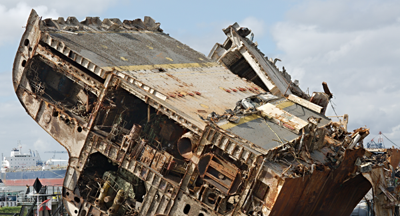ICS Leadership Insights Live: Ship Recycling round-up
As with any part of the maritime industry, ship breaking has been impacted by the changes and challenges created by COVID-19 this past year. Speakers at the ICS Leadership Insights Live event on 12 May 2021 outlined some of these impacts and what can be expected for the sector going forward.
Anil Sharma, Founder and CEO, Global Marketing Systems – one of the world’s largest buyers of vessels for recycling – detailed the market dynamics that have been driving ship recycling through the pandemic. “Commercially it has been a year of extraordinary highs and lows in ship recycling,” he said.
Around the middle of the last quarter, the market collapsed by around 5% and ship values fell by about 25%, he said.
“After a pause of around 30 days the India market came back booming with a very sharp V-shaped recovery, which has not stopped since the third quarter of last year. We have seen around a 70% rise in residual values and scrap values.”
Trends in vessel types being recycled has been impacted by the pandemic to a degree. Sharma said that 50% of the vessels that were delivered for recycling in 2020 were bulk carriers, of which Very Large Ore Carriers (VLOCs) – around 30 – made up a large portion. However, due to strong freight markets, 2021 has seen little supply of dry bulk or container vessels. “We do see a lot of offshore vessels and quite of a lot of cruise ships coming for recycling,” he noted. The latter is undoubtedly down to the massive impact the pandemic has had on the cruise ship sector.
COVID-19 impact
Sharma noted that while the values of recycled materials has risen, in large part due to a drop-off in steel exports from China and the rise in infrastructure investment in India, “we have really struggled as sellers of vessels, as traders, as intermediaries, to get ships from A to B”.
This is not the only impact COVID-19 has had on the ship breaking industry. Chintan Kalthia, CEO, R.L. Kalthia Ship Breaking, described a perfect storm of issues that yards in Alang are currently facing:
“Many workers left to go home in the first wave and have not come back. The second wave has hit hard. The government announced that no industry is able to get oxygen production and must go only to medical facilities and institutes in India. With no oxygen much of the yard work has stopped. Finally, the number of ships coming to Alang has fallen due to crew change bans in Dubai and Singapore – two port locations with the most participation in sending ships to India for recycling.”
As a result, Kalthia said that business in Alang has dropped below 50% in the last six to eight months, with ships for recycling going instead to Pakistan and Bangladesh.
The three d’s
Esben Poulsson, ICS Chair, noted that those working in the ship breaking sector have faced pressure to change its working practices:
“In the past, the sector has suffered from a negative image – being portrayed as dirty, damaging and dangerous. But much has changed: a multiplicity of regulations, including the Basel Convention, the IMO Hong Kong Convention and the EU Ship Recycling Regulation have come into force and ship breakers are working to recycle vessels in safer, more environmentally sustainable ways.”
Sharma hopes to change people’s views of the ship breaking in India, stating that it should instead be referred to using the three r’s: “reduce, recycle and reuse”. He noted that 92 states in India are now compliant to the Hong Kong Convention.
Need for transparency
Andrew Stephens, Executive Director, Sustainable Shipping Initiative, explained his organisation’s mission is to accelerate a voluntary market-driven approach to responsible ship recycling practices, driven through transparency, improving decision making and creating an industry-wide level playing field.
SSI has 28 signatories; 12 shipowners, 5 cargo owners, 7 financial stakeholder and other interested stakeholders. Disclosure of the practices that shipowners use for ship recycling is key to this initiative.
“If shipowners are transparent about their policies and practices, we believe, we’ll create fair competition, improve performance, and hold the industry to account for the vessels from cradle to grave.”
He went on to explain that ship recycling transparency will help financial stakeholders, cargo owners, and other stakeholders be accountable for the supply chain, the risks within the supply chain, assist in making informed decisions, and also “reward good practice through the market”.
Stephens noted that transparency over shipbreaking practices, as well as the need to consider the recycling of a vessel upon purchase and when selling on to other owners is a ESG (Environmental Social Governance) issue.
Decarbonisation and recycling
Shipping must also consider the impact that efforts to decarbonise the industry will have on ship recycling, and the issue of stranded assets. Stephens said:
“Shipping is on a major transition and journey that requires sober, clear thought and planning. There are market based measures and a changing regulatory landscape that will impact [ship recycling] and very likely bring a waterfall of vessels at end of life that will need recycling.”
“What happens when new kinds of vessels come for recycling?” Sharma asked. “Right now in yards, 90% is steel unless we start building with other composite materials and hope these can still be recycled. Propulsion should still be handled unless we change to nuclear.
Sharma added: “The principle of 25:25, meaning you normally obtain 25% of residual value of an asset after you recycle your ship after 25 years – which is the normal lifecycle of a vessel. So far this still exists. Will it exist in the future? That is a big question for shipowners.”
